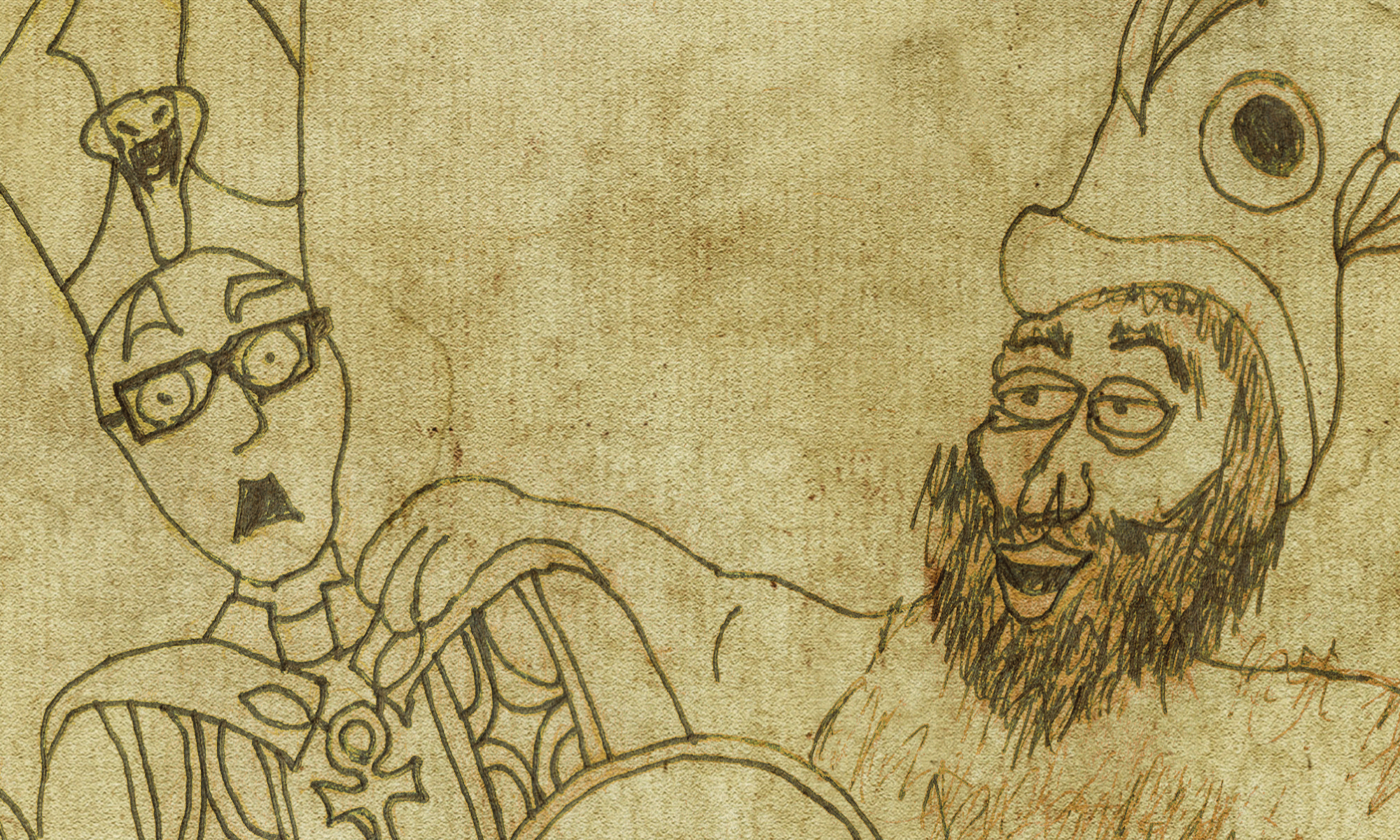
The chapter in which god plays favorites with grand children and handles family mediation poorly.
Special Guests
Wilomena – the Female Calvinist
Broc – her Male Presbyterian counterpart
Music By
Sound Credits
AHHHH – random_intruder
Contrabasses Foghorn Rumble – gsb1039
Today’s Text
Comparative Text: https://biblehub.com/genesis/4-1.htm
1 The man knew Eve his wife. She conceived, and gave birth to Cain, and said, “I have gotten a man with Yahweh’s help.” 2 Again she gave birth, to Cain’s brother Abel. Abel was a keeper of sheep, but Cain was a tiller of the ground. 3 As time passed, Cain brought an offering to Yahweh from the fruit of the ground. 4 Abel also brought some of the firstborn of his flock and of its fat. Yahweh respected Abel and his offering, 5 but he didn’t respect Cain and his offering. Cain was very angry, and the expression on his face fell. 6 Yahweh said to Cain, “Why are you angry? Why has the expression of your face fallen? 7 If you do well, won’t it be lifted up? If you don’t do well, sin crouches at the door. Its desire is for you, but you are to rule over it.” 8 Cain said to Abel, his brother, “Let’s go into the field.” While they were in the field, Cain rose up against Abel, his brother, and killed him. 9 Yahweh said to Cain, “Where is Abel, your brother?” He said, “I don’t know. Am I my brother’s keeper?” 10 Yahweh said, “What have you done? The voice of your brother’s blood cries to me from the ground. 11 Now you are cursed because of the ground, which has opened its mouth to receive your brother’s blood from your hand. 12 From now on, when you till the ground, it won’t yield its strength to you. You will be a fugitive and a wanderer in the earth.” 13 Cain said to Yahweh, “My punishment is greater than I can bear. 14 Behold, you have driven me out today from the surface of the ground. I will be hidden from your face, and I will be a fugitive and a wanderer in the earth. Whoever finds me will kill me.” 15 Yahweh said to him, “Therefore whoever slays Cain, vengeance will be taken on him sevenfold.” Yahweh appointed a sign for Cain, so that anyone finding him would not strike him. 16 Cain left Yahweh’s presence, and lived in the land of Nod, east of Eden. 17 Cain knew his wife. She conceived, and gave birth to Enoch. He built a city, and named the city after the name of his son, Enoch. 18 Irad was born to Enoch. Irad became the father of Mehujael. Mehujael became the father of Methushael. Methushael became the father of Lamech. 19 Lamech took two wives: the name of the first one was Adah, and the name of the second one was Zillah. 20 Adah gave birth to Jabal, who was the father of those who dwell in tents and have livestock. 21 His brother’s name was Jubal, who was the father of all who handle the harp and pipe. 22 Zillah also gave birth to Tubal Cain, the forger of every cutting instrument of bronze and iron. Tubal Cain’s sister was Naamah. 23 Lamech said to his wives, “Adah and Zillah, hear my voice. You wives of Lamech, listen to my speech, for I have slain a man for wounding me, a young man for bruising me. 24 If Cain will be avenged seven times, truly Lamech seventy-seven times.” 25 Adam knew his wife again. She gave birth to a son, and named him Seth, saying, “for God has given me another child instead of Abel, for Cain killed him.” 26 A son was also born to Seth, and he named him Enosh. At that time men began to call on Yahweh’s name.

1. Y’all were getting all in a tizzy about why Kain was produced with the help of the lord and not Abel. You overlooked something really simple. Kain was the first human to be conceived and born rather than created by God. So of course his parents were all “OMG! the miracle of the childbirth!” No need to bring in weird threesomes.
2. Y’all were getting into a tizzy about whether god wanted Kain to do “well” or do “good.” Here are my thoughts:
In English “well” and “good” are really the same word. “Well” is an adverb, and “good” is a noun or an adjective. So the question “Does the Hebrew text say ‘good’ or ‘well’?” doesn’t really have an answer. The Hebrew word is “tativ” which is the verb form of good/well.
When Broc looked up that reference work to see how this word is used in other contexts, I wanted to scream! Of course he found that it had connotations of moral good, because he was looking up how the word is used in the *bible*. The bible is full of moral statements. But that same word could be used to mean good, as in functional. See for example, Isaiah 41:7 where it’s used to describe good workmanship.
This is a great example of how hard it is to read the Bible in translation. You guys fixated on a word that is very simple and has a clear analog in English, and completely ignored the *very next word* which is extremely interesting and hard to translate. I think your Bibles translate it as “you’ll be rewarded” or something. That word in other contexts means “carry” or “bear,” and it’s really not clear to me what it means here.
If any Christians are reading this: FUCKING LEARN HEBREW AND GREEK! If you think this book is literally the most important thing in the world, put in the effort to read it in the original. Consulting concordances and multiple translations will confuse you as often as they help you.
3. I’m glad to see that chabad.org is recognized as providing the right answers.
Thank you for your good work. God bless . ??
We are open to everyone’s perspective, because everyone has a different view on it. We may not be convinced, but we like hearing different people’s theories about it even if the theories are totally whackadoo.